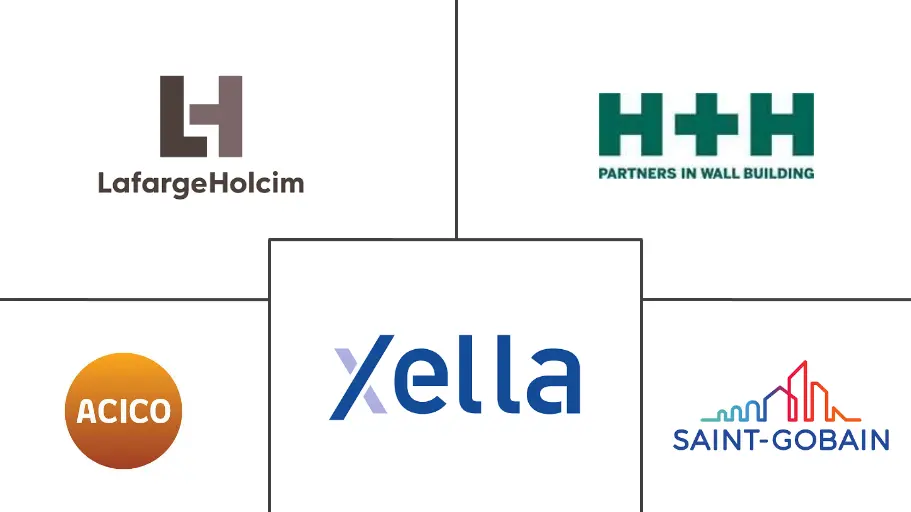Market Size of Cellular Concrete Industry

| Study Period | 2019 - 2029 |
| Base Year For Estimation | 2023 |
| CAGR | 5.50 % |
| Fastest Growing Market | Asia Pacific |
| Largest Market | Asia Pacific |
| Market Concentration | Low |
Major Players
*Disclaimer: Major Players sorted in no particular order |
Cellular Concrete Market Analysis
The global cellular concrete market is estimated to witness a healthy growth, at an estimated CAGR of over 5.5%, over the forecast period. Augmenting demand for lightweight and strong materials in the construction sector, and growing demand for thermal and acoustic insulation applications are expected to drive the market growth.
- Ease of availability of substitutes and issues with foam liquid concentrates are likely to hinder the markets growth.
- Emerging Trend of green building certifications and increasing demand for shock-absorbing concrete (SACON) are projected to act as an opportunity for the market's growth in the future.
- Asia-Pacific holds the major share in the consumption of cellular concrete. The region is also expected to witness the fastest growth during the forecast period, powered by the growth in residential, commercial, and industrial applications in the region.
Cellular Concrete Industry Segmentation
The global cellular concrete market report includes:
| Application | |
| Blocks, Panels, Arches, Lintels, Slabs | |
| Thermal and Sound Insulation in Floors, Walls, Roofs | |
| Filling of Voids, Cracks, and Cavities | |
| Dike Protections, Mooring Lines, and Ports, Construction of Floating Structures | |
| Protection of Communication Lines and Pipes | |
| Foundations and Backfills in Construction of Roads, Bridges, Tunnels, and Underground Railways | |
| Other Applications |
| End-user Sector | |||||
| Residential | |||||
|
| Geography | |||||||||
| |||||||||
| |||||||||
| |||||||||
| |||||||||
|
Cellular Concrete Market Size Summary
The cellular concrete market is poised for robust growth, driven by the increasing demand for lightweight and durable materials in the construction industry, alongside its applications in thermal and acoustic insulation. The market's expansion is somewhat tempered by the availability of substitutes and challenges associated with foam liquid concentrates. However, the trend towards green building certifications and the rising interest in shock-absorbing concrete present significant opportunities for future growth. The Asia-Pacific region dominates the consumption of cellular concrete and is anticipated to experience the fastest growth, fueled by advancements in residential, commercial, and industrial applications. The material's versatility in residential construction, from un-reinforced wall blocks to insulation plates and precast wall systems, underscores its growing importance in the sector.
In Europe and Asia-Pacific, cellular concrete is increasingly utilized due to its lightweight nature and resistance to moisture damage, making it an eco-friendly choice for various construction applications. The residential construction sector in Asia-Pacific, particularly in China and India, is witnessing stable growth, with China leading the market share. The country's significant investments in infrastructure and transportation, coupled with the lifting of restrictions on foreign investments in land development, are expected to further propel the cellular concrete market. The market remains fragmented, with key players such as H+H, Saint-Gobain, LafargeHolcim, Xella Group, and ACICO contributing to its competitive landscape.
Cellular Concrete Market Size - Table of Contents
-
1. MARKET DYNAMICS
-
1.1 Drivers
-
1.1.1 Augmenting Demand for Lightweight and Strong Materials in the Construction Sector
-
1.1.2 Growing Demand for Thermal and Acoustic Insulation Applications
-
1.1.3 Factors like Speedier Constructions, Self Levelling and Self Compacting, and Savings in Raw Material
-
-
1.2 Restraints
-
1.2.1 Issues with Foam Liquid Concentrates
-
1.2.2 Ease of Availability of Substitutes
-
-
1.3 Industry Value-Chain Analysis
-
1.4 Porter's Five Forces Analysis
-
1.4.1 Bargaining Power of Suppliers
-
1.4.2 Bargaining Power of Consumers
-
1.4.3 Threat of New Entrants
-
1.4.4 Threat of Substitute Products and Services
-
1.4.5 Degree of Competition
-
-
1.5 Raw Material Analysis
-
1.6 Regulatory Policy Analysis
-
1.7 Comparison with other building materials
-
1.8 Recent Projects
-
-
2. MARKET SEGMENTATION
-
2.1 Application
-
2.1.1 Blocks, Panels, Arches, Lintels, Slabs
-
2.1.2 Thermal and Sound Insulation in Floors, Walls, Roofs
-
2.1.3 Filling of Voids, Cracks, and Cavities
-
2.1.4 Dike Protections, Mooring Lines, and Ports, Construction of Floating Structures
-
2.1.5 Protection of Communication Lines and Pipes
-
2.1.6 Foundations and Backfills in Construction of Roads, Bridges, Tunnels, and Underground Railways
-
2.1.7 Other Applications
-
-
2.2 End-user Sector
-
2.2.1 Residential
-
2.2.2 Non-residential
-
2.2.2.1 Commercial
-
2.2.2.2 Industrial
-
2.2.2.3 Other Non-residential Constructions
-
-
-
2.3 Geography
-
2.3.1 Asia-Pacific
-
2.3.1.1 China
-
2.3.1.2 India
-
2.3.1.3 Japan
-
2.3.1.4 South Korea
-
2.3.1.5 ASEAN Countries
-
2.3.1.6 Australia and New Zealand
-
2.3.1.7 Rest of Asia-Pacific
-
-
2.3.2 North America
-
2.3.2.1 United States
-
2.3.2.2 Canada
-
2.3.2.3 Mexico
-
-
2.3.3 Europe
-
2.3.3.1 Germany
-
2.3.3.2 United Kingdom
-
2.3.3.3 Italy
-
2.3.3.4 France
-
2.3.3.5 Nordic Countries
-
2.3.3.6 Russia
-
2.3.3.7 Rest of Europe
-
-
2.3.4 South America
-
2.3.4.1 Brazil
-
2.3.4.2 Argentina
-
2.3.4.3 Rest of South America
-
-
2.3.5 Middle-East and Africa
-
2.3.5.1 Saudi Arabia
-
2.3.5.2 South Africa
-
2.3.5.3 Rest of Middle-East and Africa
-
-
-
Cellular Concrete Market Size FAQs
What is the current Cellular Concrete Market size?
The Cellular Concrete Market is projected to register a CAGR of greater than 5.5% during the forecast period (2024-2029)
Who are the key players in Cellular Concrete Market?
H+H, Saint-Gobain, LafargeHolcim, Xella Group and ACICO are the major companies operating in the Cellular Concrete Market.

